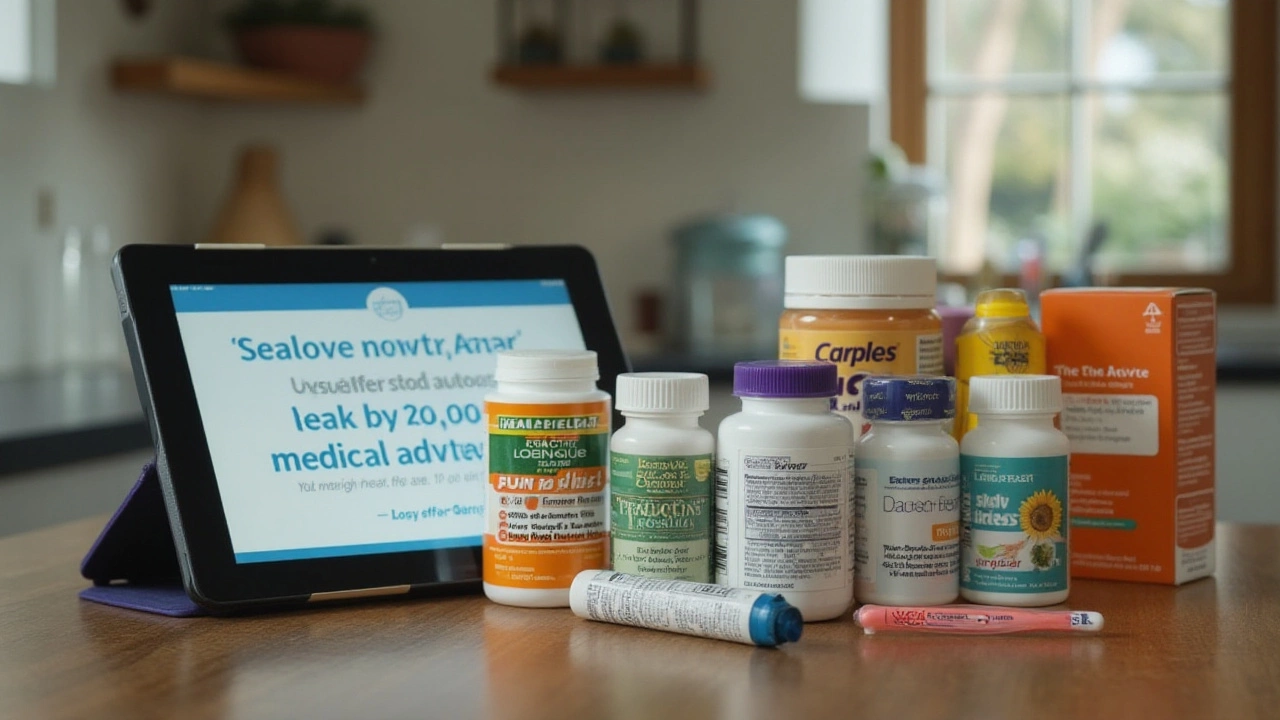 Nov, 24 2024
Nov, 24 2024
In our journey through life, health challenges arise when we least expect them, prompting a quest for solutions that may not always require a doctor’s prescription. Amoxicillin, a widely recognized antibiotic, serves as a formidable ally against bacterial infections. However, accessing it isn't always straightforward due to prescription requirements. Understanding what options exist over-the-counter is key, especially for those seeking immediate relief or unable to get a prescription promptly.
While there's no direct over-the-counter substitute for amoxicillin, understanding the scope of available alternatives can help manage symptoms or act as supportive measures. This landscape includes various natural and herbal remedies known for their potential antibacterial properties. Yet, one must tread carefully; such alternatives work differently compared to traditional antibiotics. In this realm, the wisdom of online doctor consultations can guide choices, ensuring adequate care and monitoring.
Delving into these alternatives requires insight into their benefits and limitations. As one navigates these waters, knowing when to seek professional medical intervention becomes paramount. This guide helps unravel these considerations, shedding light on how to balance self-care with timely medical advice.
- Understanding Amoxicillin and Its Uses
- Limitations of Over-the-Counter Options
- Natural and Herbal Alternatives
- The Role of Online Doctor Consultations
- When to Seek Professional Medical Advice
Understanding Amoxicillin and Its Uses
Amoxicillin belongs to a group of antibiotics known as penicillins. It's quite popular due to its broad-spectrum efficacy, meaning it can treat a wide range of bacterial infections. Specifically, amoxicillin is prescribed for conditions like ear infections, pneumonia, urinary tract infections, and even some sexually transmitted infections. What makes amoxicillin particularly valuable is its mechanism of action. It works by inhibiting the formation of bacterial cell walls, which eventually leads to the destruction of those bacteria.
It's crucial to note that, like all antibiotics, amoxicillin is only effective against bacterial infections and offers no benefit for viral infections such as the common cold or flu. The misuse of antibiotics can contribute to antibiotic resistance, a significant public health concern worldwide. The World Health Organization has repeatedly stressed the importance of this, noting that without effective antibiotics, the success of treatments like chemotherapy and surgeries may be compromised.
For decades, amoxicillin has been a go-to option for doctors not only because of its effectiveness but also due to its safety profile. It's generally well-tolerated by most patients, including children and even pregnant women, under medical supervision. Side effects, when they do occur, may include gastrointestinal discomfort, allergic reactions, or in rare cases, more severe responses. Therefore, adherence to prescribed dosages is paramount.
Amoxicillin's history dates back to its development in the 1970s, and it has since been listed as one of the essential medicines by the World Health Organization. It is available in various forms, including capsules, chewable tablets, and oral suspensions, making it convenient for different age groups and preferences. This versatility contributes to its widespread use in tackling bacterial infections effectively.
In today’s medically advanced world, access to antibiotics like amoxicillin is tightly regulated. This is to ensure that they're used appropriately and to prevent the growing issue of antibiotic resistance. According to a study published in The Lancet, inappropriate antibiotic use remains a significant challenge, with estimates suggesting over 30% of antibiotic prescriptions in outpatients may be unnecessary. This highlights the importance of seeking professional advice when dealing with infections, and why amoxicillin, though an effective treatment, must be used judiciously.
Limitations of Over-the-Counter Options
When one thinks about addressing infections or seeking relief from symptoms, over-the-counter (OTC) options often come to mind as a go-to solution. However, the reality is that OTC medications have their limitations, especially when compared to prescription antibiotics like amoxicillin. While these non-prescription solutions can be helpful for mild conditions or symptoms, they simply do not possess the capability to target and eradicate bacteria in the way that true antibiotics do. This means that while such medications can aid in alleviating discomfort, they are not cures for bacterial infections. A fascinating aspect is how societies have developed herbal remedies over centuries, sometimes backed by anecdotal effectiveness, yet the modern medical landscape highlights the necessity for precision and targeted approaches.
One of the pivotal differences between OTC solutions and prescription antibiotics is in the spectrum of their action. Antibiotics such as amoxicillin are designed to attack specific bacterial pathogens, thereby helping to resolve the root cause of infections. In contrast, OTC remedies generally aim to manage symptoms such as pain, inflammation, or congestion, without addressing the underlying bacterial infection. As such, they are often part of a more symptomatic management approach rather than a curative treatment. An important point to note is the risk of misjudging the severity of an infection. Individuals might falsely equate symptom relief with resolution of the condition, which can delay seeking necessary medical intervention.
Moreover, the misuse or overuse of OTC products can lead to unintended consequences. Prolonged use of analgesics, for example, may result in other health complications or mask symptoms that require professional evaluation. Similarly, taking herbal supplements without understanding their interactions with other medications can pose risks. Notably, immune-boosting supplements touted as amoxicillin alternatives should be approached with caution. They may potentially strengthen the body's defenses, but there's a lack of extensive scientific validation for most when it comes to treating bacterial infections.
It's interesting to realize the economic aspect of OTC options as well, which, although usually more accessible than prescription medications, can accumulate costs over time if used inappropriately. This economic factor often complicates decision-making for individuals balancing between the convenience of immediate relief and the long-term implications of managing an unresolved infection. When compounded with potential health risks, it becomes evident that while these remedies offer a quick-fix mentality, they are not devoid of limitations.
According to Dr. John Smith, a renowned microbiologist, "The perception of safety and efficacy in over-the-counter drugs can often lead consumers to misuse these products without understanding their true pharmacological limits. Interestingly, this misunderstanding can hinder appropriate medical intervention, prolonging the duration of the ailment."
Ultimately, despite the appeal of OTC antibiotics, it's vital for individuals to recognize the crucial role of professional guidance. Online doctor consultations can bridge this gap, allowing for the assessment of symptoms and advice on appropriate actions. These consultations can provide clarity, suggesting whether OTC options are suitable or if prescription medications become necessary. With the breadth of digital health solutions growing, individuals are equipped better than ever to make informed choices that factor in the limitations of over-the-counter remedies.

Natural and Herbal Alternatives
When it comes to treating ailments, particularly those which may require antibiotics like amoxicillin, many are intrigued by natural and herbal alternatives. The interest in plant-based solutions is not unfounded; for centuries, various cultures have harnessed the medicinal properties found in nature. These remedies can potentially support the body’s immune system, possibly easing symptoms or reducing the severity of common infections. Among the most talked-about are garlic, honey, and echinacea, whose roles in supporting well-being are widely acknowledged.
Garlic, with its distinctive aroma and flavor, is more than a kitchen staple. Known for its allicin content, it has been studied for its potential antibacterial and antiviral properties. Some suggest that incorporating raw garlic into one’s diet could possibly aid in enhancing the body’s defenses against minor infections. Echinacea, often associated with its coneflower, is another herbal alternative believed to boost the immune response, thus potentially reducing the duration of common colds or flu-like symptoms. While efficaciousness can vary, these natural remedies can serve as an adjunct to traditional care, particularly in promoting general health.
One must remember, however, that while natural solutions offer promising benefits, they are not silver bullets. The complexity of bacterial infections often necessitates a tailored approach that may not be fully addressed through herbs alone.
Cynthia Sass, a well-regarded nutritionist, once noted, "Herbal remedies are a complement, but not a replacement for conventional care in serious infections." This underscores the importance of using these remedies as part of a broader health strategy.Engaging with professionals via online doctor consultations can help people navigate which of these alternatives might work best for their individual circumstances.
These herbal options also come with a degree of precaution. Allergies or adverse reactions are possible, emphasizing the need for careful introduction into one’s routine. Start with small doses, monitor for any unwanted symptoms, and consult healthcare providers to avoid contraindications with existing medications. Let’s remember that the reassurance of knowing when and how to intervene with the right approach can make all the difference.
Incorporating herbal remedies into everyday life might also involve a lifestyle shift. Embracing a diet rich in foods with natural antibiotic properties, coupled with other healthy habits—like adequate hydration, rest, and stress management—can create a more formidable defense against illnesses. For instance, honey is not just a sweetener, but a powerful agent known for its antimicrobial properties, often used in soothing sore throats and enhancing flavor while also purportedly lending support to immune health. Striking a balance between these alternatives and mindful healthcare can empower individuals on their wellness journey.
The Role of Online Doctor Consultations
The digital age has unraveled a new frontier in healthcare where the walls of traditional clinics extend into the virtual world. Thanks to the advent of technology, online doctor consultations have become indispensable, particularly when navigating minor health concerns. When it comes to exploring alternatives to antibiotics like amoxicillin, these virtual consultations offer not just convenience but also a plethora of benefits. They allow patients to discuss symptoms, ask questions, and receive timely advice on suitable amoxicillin alternatives without leaving their homes. This approach often includes video calls, chat forums, and sometimes even email exchanges, making healthcare accessible at the click of a button. The privacy and comfort of one's living room transform into a consultation room, bridging gaps between experience and immediate medical need.
The beauty of online doctor consultations lies in their adaptability. They are designed to cater to a wide array of medical issues, ranging from general inquiries to specific concerns like understanding possible OTC antibiotics. Doctors can provide guidance on whether symptoms warrant antibiotic intervention or if other methods could be explored. This is crucial because misuse or overuse of antibiotics remains a significant concern globally. Interestingly, recent studies have indicated a 20% increase in online medical consultations over the past few years, reflecting their growing crucial role in healthcare.
Moreover, maintaining a database of patient information and consultation history becomes easier through digital platforms. With robust systems in place, doctors can make informed decisions swiftly. They also aid in reducing the waiting time often associated with in-person visits, ensuring that individuals get the help they need promptly. For instance, accessing pharmacy solutions remotely can facilitate immediate steps towards treatment, whether through natural remedies or pharmaceutical advice. This seamless integration of digital and medical science enhances patients' trust and encourages proactive health management.
It's fascinating to note how these consultations are shaping future healthcare models. By incorporating advanced analytics and patient feedback, doctors can create tailored advice paths for common inquiries like searching for pharmacy solutions when traditional options are limited. The focus remains on personalized care, addressing each patient's unique needs and concerns. A professor of healthcare communications once aptly stated,
"The future of medicine is embedded in how we harness technology to deliver personalized care for everyone."This echoes the sentiment that as technology progresses, so too does the quality and precision of healthcare delivery.
These online interactions also play a pivotal role in educating the public about antibiotic alternatives. Recognizing symptoms early, understanding when medication is needed, and when it is not, all contribute to better decision-making. While they do not replace the necessity for physical examinations in severe cases, virtual consultations provide a stepping stone that can deter the over-prescription of antibiotics. Harnessing this method not only alleviates burdens from traditional healthcare systems but also empowers individuals to participate more actively in their health journey.

When to Seek Professional Medical Advice
It's crucial to recognize when it’s time to consult a healthcare professional, especially in cases involving possible infections that might require antibiotics like amoxicillin. Self-diagnosing and treating severe symptoms without guidance can lead to complications. For instance, while herbal remedies and over-the-counter treatments might offer relief for minor issues, they lack the targeted efficacy found in prescription antibiotics. When symptoms persist for more than a few days or when they rapidly worsen, seeking advice from a doctor is vital. This isn't just about personal comfort; it's about preventing the escalation of an infection, which in severe cases, could lead to something as serious as blood poisoning or sepsis.
There are specific indicators that should not be dismissed. High fever that refuses to subside, intense pain in the area of infection, or chronic fatigue may signal that over-the-counter solutions aren't enough. Sometimes, signs like a persistent cough, swollen lymph nodes, or unusual discharge suggest that your body might be fighting a bacterial infection that requires more than just symptomatic relief. Ignoring such signs can lead to a longer recovery time or even hospitalization. It's interesting to note that according to a WHO report, antibiotic resistance has become a major concern globally because of the misuse of antibiotics. This is further emphasized in their findings showing that inappropriate use of non-prescription antibiotics contributes to the emergence of resistant bacteria.
Online doctor consultations present a convenient and accessible option for those who either cannot reach a clinic physically or want quick advice on symptoms that are ambiguous. The beauty of technology is that it connects people with seasoned professionals almost instantly, enabling informed decisions about whether pharmacy solutions or prescription medication is needed. Many patients find this method reassuring, as it provides personalized insights without the wait times traditionally associated with in-person visits. However, it is important to ensure that the medical advice sought online is from qualified sources. Websites offering these consultations usually vet their practitioners, but checking credentials can never hurt.
In essence, the wisdom of knowing when to step away from DIY health remedies and seek the guidance of a healthcare professional can’t be overstated. This choice is about more than just acting on symptoms; it's about protecting one's health proactively. The growing field of telemedicine is a testament to the demand for accessible professional input when health comes into question. In summary, listen to your body, trust your intuition, and when in doubt, remember that reaching out to healthcare professionals is a step towards wellness and recovery. Thus, understanding OTC antibiotics can be invaluable, but knowing when they fall short is even more imperative.
